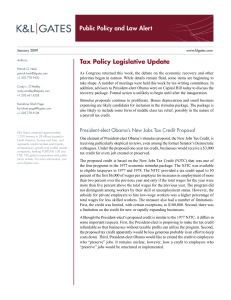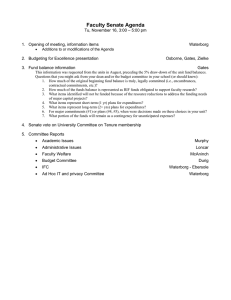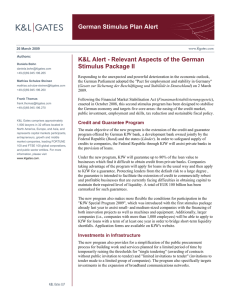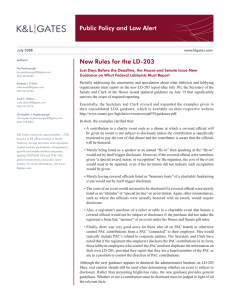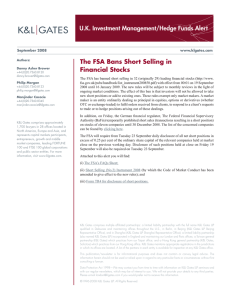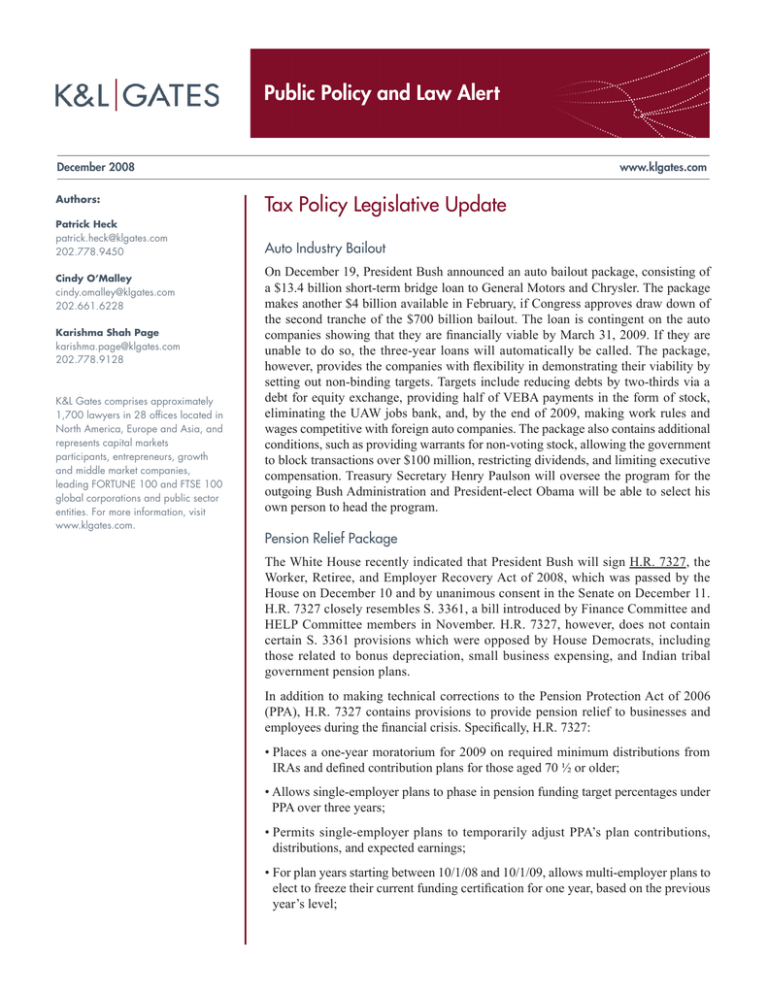
Public Policy and Law Alert
December 2008
Authors:
www.klgates.com
Tax Policy Legislative Update
Patrick Heck
patrick.heck@klgates.com
202.778.9450
Cindy O’Malley
cindy.omalley@klgates.com
202.661.6228
Karishma Shah Page
karishma.page@klgates.com
202.778.9128
K&L Gates comprises approximately
1,700 lawyers in 28 offices located in
North America, Europe and Asia, and
represents capital markets
participants, entrepreneurs, growth
and middle market companies,
leading FORTUNE 100 and FTSE 100
global corporations and public sector
entities. For more information, visit
www.klgates.com.
Auto Industry Bailout
On December 19, President Bush announced an auto bailout package, consisting of
a $13.4 billion short-term bridge loan to General Motors and Chrysler. The package
makes another $4 billion available in February, if Congress approves draw down of
the second tranche of the $700 billion bailout. The loan is contingent on the auto
companies showing that they are financially viable by March 31, 2009. If they are
unable to do so, the three-year loans will automatically be called. The package,
however, provides the companies with flexibility in demonstrating their viability by
setting out non-binding targets. Targets include reducing debts by two-thirds via a
debt for equity exchange, providing half of VEBA payments in the form of stock,
eliminating the UAW jobs bank, and, by the end of 2009, making work rules and
wages competitive with foreign auto companies. The package also contains additional
conditions, such as providing warrants for non-voting stock, allowing the government
to block transactions over $100 million, restricting dividends, and limiting executive
compensation. Treasury Secretary Henry Paulson will oversee the program for the
outgoing Bush Administration and President-elect Obama will be able to select his
own person to head the program.
Pension Relief Package
The White House recently indicated that President Bush will sign H.R. 7327, the
Worker, Retiree, and Employer Recovery Act of 2008, which was passed by the
House on December 10 and by unanimous consent in the Senate on December 11.
H.R. 7327 closely resembles S. 3361, a bill introduced by Finance Committee and
HELP Committee members in November. H.R. 7327, however, does not contain
certain S. 3361 provisions which were opposed by House Democrats, including
those related to bonus depreciation, small business expensing, and Indian tribal
government pension plans.
In addition to making technical corrections to the Pension Protection Act of 2006
(PPA), H.R. 7327 contains provisions to provide pension relief to businesses and
employees during the financial crisis. Specifically, H.R. 7327:
• Places a one-year moratorium for 2009 on required minimum distributions from
IRAs and defined contribution plans for those aged 70 ½ or older;
• Allows single-employer plans to phase in pension funding target percentages under
PPA over three years;
• Permits single-employer plans to temporarily adjust PPA’s plan contributions,
distributions, and expected earnings;
• For plan years starting between 10/1/08 and 10/1/09, allows multi-employer plans to
elect to freeze their current funding certification for one year, based on the previous
year’s level;
Public Policy and Law Alert
• F or plans in place in 2008 and 2009, allows
multi-employer plans to elect to extend funding
improvement or rehabilitation periods by three
years, from 10 to 13 years; and
• Temporarily suspends limits on benefits accruals
for participants in underfunded pension plans.
The Joint Committee on Taxation Technical
Explanation provides a detailed analysis of the
legislation.
There have been some indications that Congress may
consider additional retirement security legislation
in 2009.
Economic Recovery Package
Coordination between Congressional leaders and the
Obama Transition Team on an economic recovery
package is beginning to ramp up. House Speaker
Nancy Pelosi recently suggested a $600 billion
stimulus package, of which $200 billion would be
in the form of tax relief. The Obama Transition
Team has indicated that the stimulus package will be
$600 billion at its lowest; it will more likely range
between $700 billion to $1 trillion.
The components of the stimulus bill will crystallize
as Congressional leaders and the Obama Transition
Team negotiate its details. The Obama Transition
Team has suggested that the stimulus package
should have a strong focus on projects that have the
ability to jump-start the economy and create jobs
over the next 12 to 18 months. The package is likely
to include assistance to state and local governments,
an extension of unemployment benefits, and an
increase in food stamp allotments. The stimulus
package is also likely to include infrastructure
projects, particularly in the areas of broadband
technology and energy. Senate Finance Committee
Chairman Max Baucus (D-MT) recently suggested
$18 billion for renewable energy use and production.
Senate staff have indicated that measures are likely
to focus on various tax incentives to make them
more effective during the recession. Ideas under
consideration include monetizing benefits by
providing refundability and/or tradeability of various
energy tax credits, extending NOL carrybacks, and
allowing taxpayers to monetize NOLs, rather than
direct spending. In a letter to Chairman Baucus and
Ranking Member Chuck Grassley (R-IA), Senator
Orrin Hatch (R-UT) recently proposed extending
the NOL carry back period to up to 15 years on a
permanent basis.
Some observers have suggested that the stimulus
package may be used for extenders or to create a
platform for President-elect Obama’s longer-term
goals. Senate staff have suggested, however, this
will largely be determined based on the size of the
stimulus package and the continued acceptance
of large spending measures. If these projects are
not included in the economic recovery package,
they may continue to be pursued as priorities in the
coming months.
For example, individual tax relief may be targeted in
the stimulus or other legislation. Proposals will likely
include extension of child tax credits, elimination of
the marriage penalty, and extension of state and
local property tax deductions. The 2001 and 2003
income tax cuts and dividend and capital gains
rate reductions will likely be extended for middleincome individuals. There is, however, continued
debate about when the tax treatment of the top two
income brackets and rates on investment income
will be increased. Although President-elect Obama
campaigned on increasing the capital gains and
dividends rates for higher-income individuals from
15 to 20 percent, the incoming Administration may
defer those increases next year and instead allow the
2003 tax cuts to expire in 2010.
Chairman Baucus and House members have also
suggested that the extension of SCHIP may be
included in the stimulus. If the program is not
included in the stimulus package, Senate aides have
suggested that SCHIP reauthorization will be an
early priority next year.
Although Congressional leaders initially indicated
they would like to pass an economic recovery
bill by President-elect Obama’s inauguration, it is
not clear whether the small window will provide
sufficient time. Senate staff have indicated that
Senate Majority Leader Harry Reid (D-NV) and
Chairman Baucus prefer to employ the traditional
channels of committee consideration, rather than
December 2008 | 2
Public Policy and Law Alert
passing stimulus legislation by unanimous consent.
Although enactment of the bill will likely occur in
early 2009, Senate consideration may delay passage
past the January 20 deadline.
Because the stimulus package will be considered an
emergency measure, it will not have to meet payas-you-go requirements. Although certain House
Democrats may attempt to insist on tax increases
or spending cuts in order to finance the stimulus
package, the current economic outlook may stifle
support for their efforts.
K&L Gates comprises multiple affiliated partnerships: a limited liability partnership with the full name K&L Gates LLP qualified in Delaware and
maintaining offices throughout the U.S., in Berlin, in Beijing (K&L Gates LLP Beijing Representative Office), and in Shanghai (K&L Gates LLP Shanghai
Representative Office); a limited liability partnership (also named K&L Gates LLP) incorporated in England and maintaining our London and Paris offices;
a Taiwan general partnership (K&L Gates) which practices from our Taipei office; and a Hong Kong general partnership (K&L Gates, Solicitors) which
practices from our Hong Kong office. K&L Gates maintains appropriate registrations in the jurisdictions in which its offices are located. A list of the
partners in each entity is available for inspection at any K&L Gates office.
This publication/newsletter is for informational purposes and does not contain or convey legal advice. The information herein should not be used or
relied upon in regard to any particular facts or circumstances without first consulting a lawyer.
Data Protection Act 1998—We may contact you from time to time with information on K&L Gates LLP seminars and with our regular newsletters,
which may be of interest to you. We will not provide your details to any third parties. Please e-mail london@klgates.com if you would prefer not to
receive this information.
©1996-2008 K&L Gates LLP. All Rights Reserved.
December 2008 | 3

